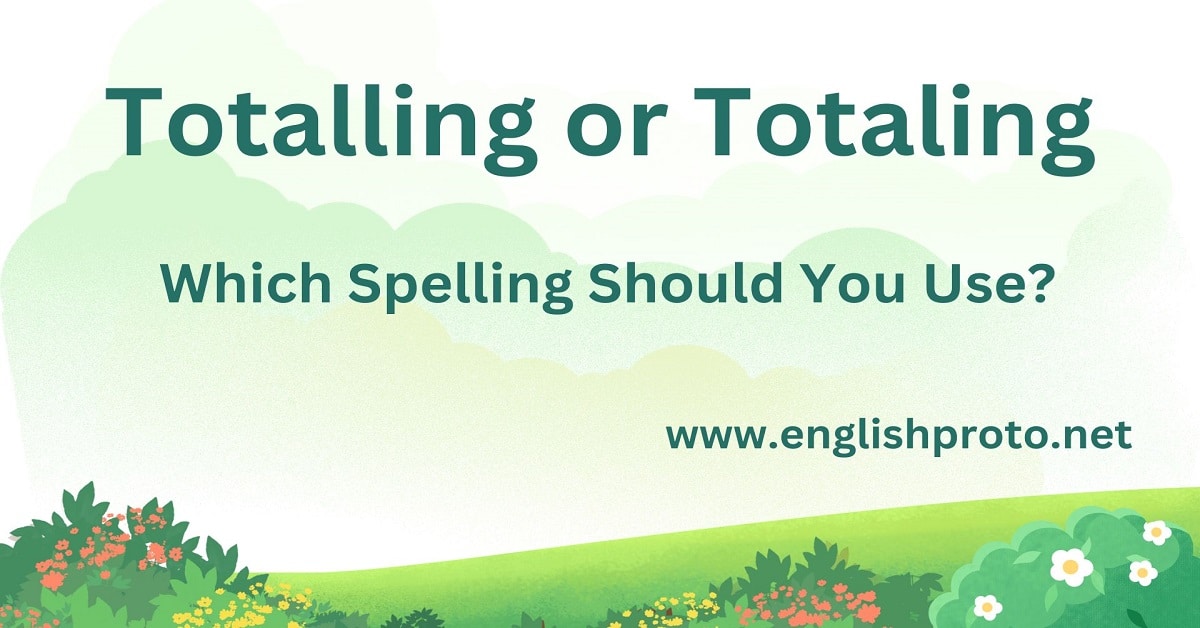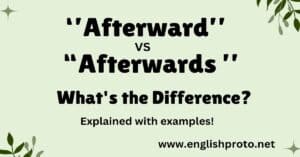Totalling or Totaling: Which Spelling should you Use? It’s a small detail, but one that often trips up even the best of writers. Whether you’re drafting an email, a report, or even just chatting online, getting the spelling right can make a big difference in how polished your writing appears. But with two acceptable versions, which one should you choose?
Don’t worry, we’ve got you covered! In this article, we’ll break down the differences, clear up the confusion, and make sure you know exactly which spelling to use no matter where you’re writing from. Keep reading to become a pro at using these words correctly!
Quick Summary
The distinction between totalling and totaling primarily comes down to regional spelling conventions:
- Totalling is the preferred form in British English.
- Totaling is the preferred form in American English.
Both spellings are used to mean the same thing the process of adding things up or calculating a total. The confusion arises because both forms sound identical when spoken, and their meanings are the same. However, the rules governing their use differ based on which variety of English you are following.
Key Takeaways:
- Totalling: Use this if you’re writing in British English.
- Totaling: Use this if you’re writing in American English.
- Both forms are correct, but consistency is crucial when choosing which to use.
- If you’re writing for an international audience, consider the style guide of your organization or region.
Reasons for Confusion
The confusion between totalling and totaling stems from a combination of regional differences, historical influences, and the fact that both spellings sound the same. Let’s break it down:
1. Regional Variations in Spelling
English is spoken across the world, and there are notable spelling differences between British English and American English. Historically, British English has preserved older forms of words, while American English has simplified or altered spellings for easier consistency.
For example, British English tends to retain double consonants when adding suffixes, while American English simplifies the rule. This is why in British English, you have travelling, cancelled, and totalling, but in American English, those words are spelled traveling, canceled, and totaling.
2. Phonetic Similarity
Both totalling and totaling are pronounced exactly the same. This adds to the confusion, as it’s not immediately obvious from the spoken form which spelling should be used. In written English, context (regional style) helps clarify which form is appropriate.
3. Historical Evolution of English
The divergence between British and American spelling can be traced back to the influence of figures like Noah Webster. Webster, an American lexicographer, was passionate about simplifying English spelling rules.
His reforms in the early 19th century sought to standardize American English and make it more phonetic. Many words that retained extra letters in British English were simplified in American English, leading to the elimination of some doubled consonants, such as in totaling.
Detailed Explanation
Let’s explore the correct usage of both spellings in greater detail.
Totalling (British English)
In British English, when adding a suffix (like -ing) to a word that ends in a consonant, British writers tend to double the final consonant if the syllable is stressed. Since the word total has a stressed final syllable, the British spelling is totalling.
For example:
- Totalling the expenses means adding them up to get a final figure.
Why use totalling?
- This spelling is considered the “traditional” form.
- It aligns with British English conventions, which often maintain the original rules for doubling consonants.
- It’s useful when writing for an audience familiar with British spelling norms, whether in the UK or countries that follow British English.
Totaling (American English)
In American English, the rule for doubling consonants is simpler: American English often avoids doubling the final consonant when adding suffixes. Therefore, when you add -ing to total, you get totaling instead of totalling.
For example:
- Totaling the sales data refers to calculating the overall sum of the data.
Why use totaling?
- This spelling is simpler and follows American English’s tendency to avoid doubling consonants.
- It is consistent with other American spelling conventions that simplify English rules.
- It’s appropriate for an American audience, including in publications, websites, and business communications in the U.S.
Common Errors
Despite the simple distinction, many writers make errors when choosing between totalling and totaling. Below are some common mistakes to avoid:
1. Inconsistent Usage
In longer documents, it’s essential to stick to one form once you’ve chosen a spelling convention. Mixing British and American English in the same document can confuse readers and detract from the overall professionalism of the text.
Incorrect:
- “The accountant is totalling the revenue, while he is also totaling the expenses.”
Correct: - “The accountant is totaling the revenue, while he is also totaling the expenses.”
2. Incorrect Application of Spelling Rules
Sometimes, writers mistakenly apply British spelling rules to American English contexts or vice versa. This leads to confusion in documents where spelling rules don’t align with regional expectations.
Incorrect:
- “The team is totalling the hours worked on the project.” (in American English context)
Correct: - “The team is totaling the hours worked on the project.”
Synonyms or Alternatives
If you feel that the word totalling or totaling might not be the most appropriate for your context or if you’re looking for variety, there are several alternative phrases that can be used in place of these terms:
- Adding up
- Summing up
- Calculating the total
- Tallying
- Aggregating
Each of these can be used when referring to the process of determining the total sum or value. For instance, instead of saying “The accountant is totalling the receipts,” you might say “The accountant is adding up the receipts.”
Examples in Sentences
Here are more examples to reinforce how to use totalling and totaling properly in sentences:
British English:
- “The teacher is totalling the scores from the exam.”
- “They spent hours totalling the funds raised for charity.”
- “The assistant is totalling all of the figures on the spreadsheet.”
American English:
- “The project manager is totaling the cost of materials.”
- “After the sale, the accountant started totaling the earnings.”
- “I spent the whole afternoon totaling the number of attendees.”
Origins and History
The origins of the spelling differences between British and American English date back to the early days of the United States. Noah Webster, a key figure in shaping American English, was concerned with making the language more consistent and easier to learn.
He introduced numerous spelling reforms, many of which involved simplifying British spellings. The change from totalling to totaling fits into this broader trend of simplification.
Historically, the British form totalling remained close to the traditional English rules derived from Latin and Old French. Meanwhile, Webster’s influence caused a shift toward simpler, more phonetic spellings in American English.
Conclusion
In conclusion, both totalling and totaling are correct spellings, but the form you use should depend on the variety of English you’re writing in. Totalling is the proper spelling in British English, while totaling is used in American English.
Choosing the correct form can help avoid confusion and ensure that your writing remains clear and professional. Whether you’re writing a business report, an academic paper, or just a casual blog post, sticking to one spelling throughout your document will make your communication more polished and cohesive.
Quick Tip: If you’re unsure which form to use, check the relevant style guide (like The Chicago Manual of Style for American English or Oxford English Dictionary for British English) to make sure you’re following the correct convention for your audience.
By understanding these spelling conventions, you can confidently navigate the quirks of English spelling, impressing your readers with your linguistic precision.



